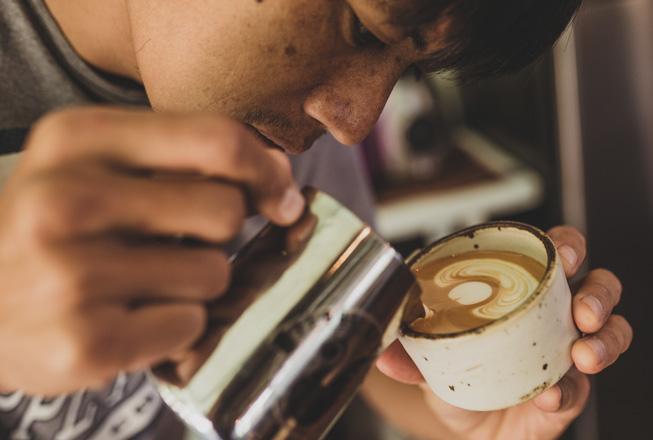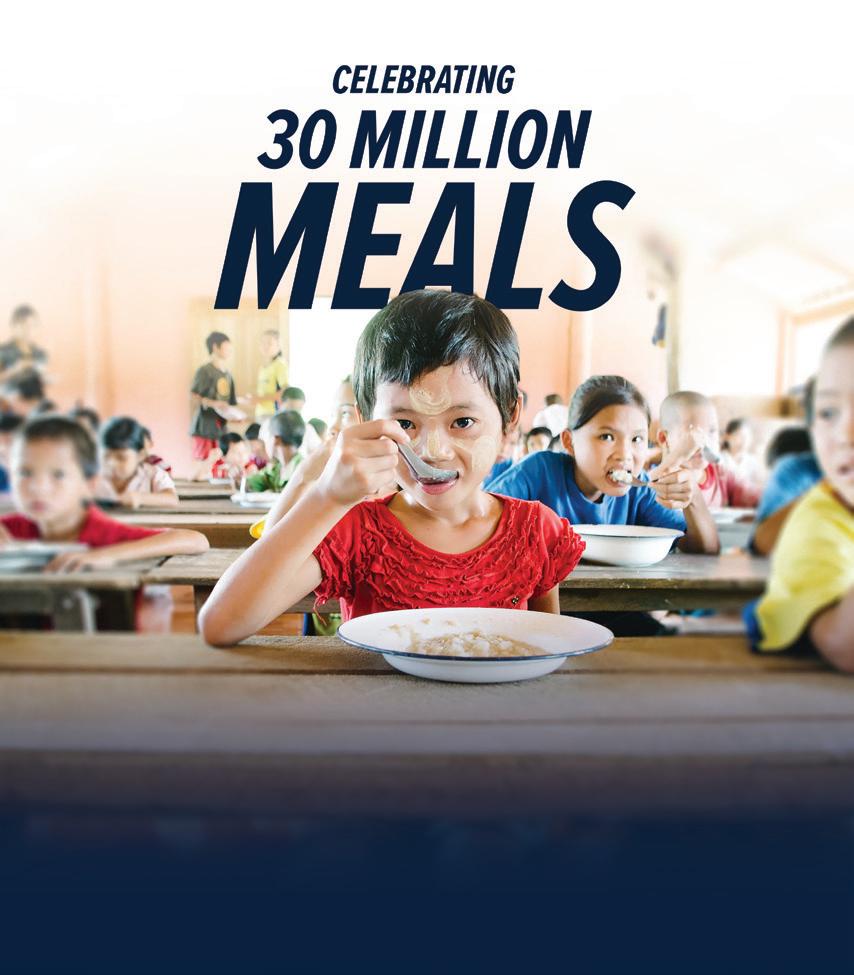
5 minute read
Fields of Hope
FIELDS OF HOPE IT USED TO BE AN OPIUM FARM. NOW, IT’S BEARING FRUIT OF THE KINGDOM.
SUPON’S STORY
F
or decades Supon’s family grew opium in the rich soil of Doi Chang, a village nestled in the border hills of Asia’s Golden Triangle. Now they grow coffee and the Kingdom of God.
Supon grew up in the Lisu Tribe, one of the hundreds of ethnic minority groups residing in Northern Thailand. His family worshiped their ancestors and the spirits of the land. Supon’s Grandfather was a respected witch doctor in his community and was addicted to opium. Supon’s Grandfather eventually died from his addiction. As a young man, Supon left Doi Chang to study theology. He wanted to learn how to help the villagers who are stateless refugees and lack access to basic resources. He returned in 2012 to work on his family’s coffee farm and discovered a love for the process, from plant to brew.
He also discovered that he could help his fellow villagers by teaching them to produce specialty coffee. In 2018 Supon and his wife started Sirinya Coffee, a boutique coffee
company with micro-lot, single-origin coffee. Supon now has a coffee shop that overlooks 10 acres of his specialty coffee plantation. In 2019 Sirinya Coffee employed 5 full-time and 15 part-time people from the village. They also worked with 15 other local farmers in their community to sell their coffee cherries for a higher price.
Supon has a desire to use business as a tool for sharing the Gospel in the mountain villages surrounding his home. As Supon’s company continues to grow in Doi Chang so do his opportunities to share his faith. Supon opens his coffee shop on Sundays for believers in his community to meet and worship together. He also uses his work relationships to share the love he’s found in Christ.
“The most important thing about our coffee business is that we can use it to share the holistic Gospel. We can talk with people about both their physical and spiritual needs. Ultimately they will know and understand God’s grace,” says Supon. “The perfect grace of God does not only heal your spiritual life, I believe it can heal your physical life as well.” Supon’s wife Oil agrees. “People cannot farmers in Doi Chang for the past three years of their crop. These farmers, many of whom are neighbors of Supon, have been forced to take out loans to pay for fertilizer and pesticides to preserve their crops.
“I will probably be in a never-ending cycle of debt to the bank,” said one farmer who now owes about 300,000 baht (roughly $9,000). Labor rights experts said these kinds of debts will likely put farmers at risk of debt bondage, a common form of modern-day slavery, where people are locked into exploitative work to repay debts.
VENTURE PARTNERSHIP WITH SIRINYA
hear the Gospel when they are hungry,” she explains. “Through Sirinya coffee, people can afford to eat and escape modern-day slavery.”
Supon and Oil help vulnerable farmers escape exploitation from large commercial coffee companies by teaching them to grow specialty coffee and sell their beans for a higher price in both domestic and international markets.
The Thomson Reuters Foundation reported in February 2020 that Doi Chang Coffee, a major Thai coffee brand, has not paid about 200 Supon was introduced to Venture by Melody Murray, the founder of a non-profit accelerator program that equips entrepreneurs who help vulnerable communities. She approached Venture with a proposal in late 2018 to provide a line of credit as seed money for Supon to scale the Kingdom impact Sirinya has in its community and around the world.
“Venture has supported Sirinya coffee since the beginning.” Supon grins as he reflects on the role of Venture in his business. “They paid for our coffee machine. They supported us to build the buildings for drying the coffee. They helped us get what we needed. That’s why we can now have a quality product. This has helped the community escape the cycle associated with opium. It has helped them have a better life.”
Supon needed a low-interest $50,000 loan to build better facilities for washing, processing, and drying coffee beans. Sirinya could then increase the production of specialty coffee in

the community and sell its crop for a higher price in international markets. This would allow local farmers to have leverage with coffee companies that treated them unfairly. Supon’s love for God and his vision to use business to build the Kingdom of God, along with Murray’s innovative partnership model, moved Venture Board members to work with Sirinya Coffee.
In 2019, Supon doubled his revenue and impact in the community. He started a cooperative for 15 local farmers who weren’t receiving fair wages and helped them produce specialty coffee. He is using his business to grow the Kingdom of God through his business relationships and by opening his coffee shop for worship.
“We love Supon and Oil.” Murray says. “They embody what we believe redemptive entrepreneurs can do for a community. As followers of Jesus, they live out the principles of Jesus, especially humility,
excellence, and integrity. Their lives and their product represent Jesus in this way. We see this in how they treat people and their processes. All of this just brings God glory.”
WATCH THE STORY
IT ALL STARTS WITH FOOD. BUT IT DOESN’T END THERE.
Over the past 8 years, we’ve delivered over 30 million meals.

Sometimes food is a response to a refugee crisis in a conflict zone, but it leads to education and discipleship programs. Sometimes food needs are addressed through farming and agri business which provide long term solutions for impoverished communities. Sometimes food is a response to a natural disaster, and is distributed through the underground church in closed countries. Sometimes food is used in church planting and evangelism strategies to reach the most marginalized in remote areas. But food is always a part of a broader strategy to respond to needs, equip communities, and plant churches—providing both physical and spiritual bread.






